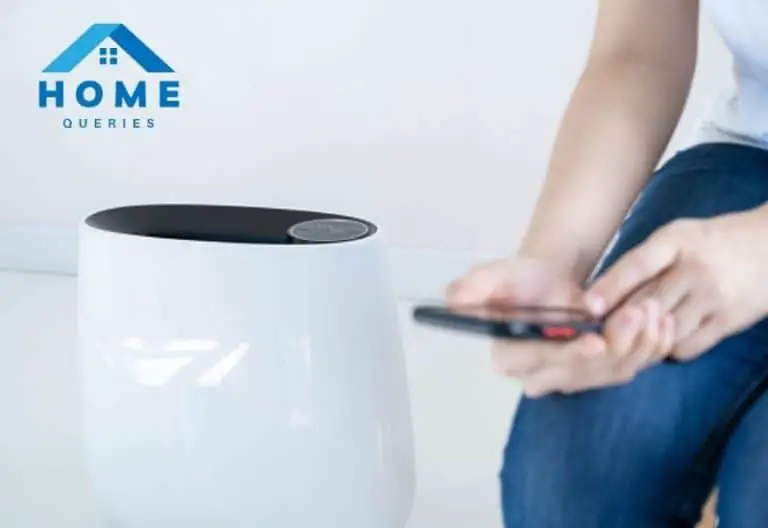The exhaust air from the air conditioner’s exterior unit is not dangerous. The exhaust produces no hazardous chemicals or gasses. In reality, the exhaust air is ambient air that has been heated up.
However, if the outside unit is not cleaned regularly, dust may accumulate, and the exhaust air will become polluted. So, is air conditioner exhaust dangerous?
Some people believe that the air conditioner emits toxic fumes that damage their health. Understanding the operating principle of the air conditioner’s exterior unit and the refrigerant gas can help to clarify matters. Below we have a detailed analysis of the question with some solutions also.

Is Air Conditioner Exhaust Dangerous?
A traditional air conditioning machine produces no chemical pollutants. As a result, there are no poisonous gasses. There is no air or chemical compounds in either of these areas.
Analyzing The Split Air Conditioner’s Outdoor Unit
Because it is constantly humbly working at the back of the home, and we probably only see it once during the installation, the external air conditioner receives little attention compared to the internal team.
As a result, it’s logical that most people are unfamiliar with the outdoor unit. Many people are unaware that the outdoor unit is the primary power source for the air conditioning system.
What Happens At The Air Conditioner’s Outdoor Unit?
A modern air conditioner uses the refrigeration cycle to remove heat and moisture from a room to achieve cooling and increase comfort. The heat from the evaporator is absorbed by the refrigerant, which then rejects it at the condenser.
The compressor and condenser are the two primary components of the outside unit. The compressor compresses and pushes the refrigerant gas to the condenser.
A finned tube heat exchanger makes up the majority of the condenser. To remove the heat from the condenser, a cooling fan will introduce outside air. The refrigerant gas condenses into liquid form as the temperature drops, and it continues its journey to the evaporator.
The exhaust air from the air conditioner’s exterior unit is just outside air at a higher temperature. As a result, it isn’t toxic.
What Happens To The Refrigerant?
The refrigerant in an air conditioning system operates in a closed-loop. Unless there is a leak, the air conditioning system will stop working, the system consumes no refrigerant and does not discharge any refrigerant to the environment.
R22 refrigerant was used in air conditioners in the past. The R22 refrigerant was phased out, and R410a became the standard. The industry is now shifting to R32 refrigerants. These refrigerant swaps aim to help minimize ozone depletion and limit global warming by switching to a more environmentally friendly refrigerant.
Class A (Lower Toxicity) refrigerants include R22, R410a, and R32. According to ASHRAE Standard 34, Class A refrigerants have no known toxicity at quantities equal to or less than 400ppm. Because of natural ventilation, reaching a concentration of 400ppm for these refrigerants is nearly impossible in a typical dwelling.
The refrigerant gas that has escaped from the exterior unit will be transported away by the smallest airflow. The refrigerant gas will never accumulate to the point where it is harmful. As a result, even if the refrigerant gas leaks, the air conditioner exhaust air is safe.

Is It Safe To Use Portable Air Conditioners?
Is it safe to use a portable air conditioner? Simply put, it extracts heat and moisture from your air and transports them outside.
Almost all air conditioners employ a refrigerant capable of absorbing massive amounts of heat from an “evaporator” coil while in the vapor phase, then transferring that heat to a “condenser” coil when compacted into a liquid. Most cooling appliances, such as refrigerators, freezers, portable ice makers, and air conditioners employ this two-phase system.
Whatever brand of air conditioner you have, the chilly side is pretty much the same. Air from your room passes over a freezing evaporator coil, absorbing heat and condensing humidity into water droplets.
Where the differences truly matter is on the hot side of the air conditioning system. An oversized condenser coil with a large fan will be installed outside your home as part of a central system to help transfer heat into the surrounding air.
Because the compressor and condenser fan generates the most noise in the design, putting them outdoors makes the system even quieter. Because the compressor and fan are still outside the window, a decent window air conditioner is still reasonably modest.
A portable air conditioner’s hot-side components must be kept inside the chassis that sits alongside you in your room. If you wish to chill your space, the air that takes heat away from the condenser coil must exit through the vent hose. The heat will stay in the room if you don’t use the exhaust pipe.
Air that is ejected by portable air conditioners is not dangerous. The exhaust air is just hot air that is supposed to be vented outside the house. You will be fine if you breathe the exhaust air from portable air conditioners.
Allowing your portable air conditioner’s exhaust air to circulate inside your home, on the other hand, considerably diminishes the cooling impact and increases the portable air conditioner’s power usage.
Although portable air conditioner exhaust air is not dangerous, it must be directed to the outside of your home for the portable air conditioner to function correctly.
What Happens If You Use A Portable Air Conditioner Without A Vent/Exhaust?
A portable air conditioner in cooling mode works similarly to a dedicated dehumidifier. One key difference is that portable air conditioners drip caught water over the hot condenser coil, which improves heat removal efficiency and eliminates the need to empty a tank every hour. It’s a win-win situation if you throw that hot air and humidity outside.
However, if you remove the vent hose, the AC will cycle your room air between cool and dry and hot and humid. Because most units use around 1,000 watts of power, this will heat your room more than it will cool it down.
Switching a portable air conditioner to “dehumidifier” mode doesn’t modify the heat produced. Still, it directs the water to a catch-tank (or, better yet, out of a drain hose) rather than back into the air. In this scenario, the main difference between a portable AC unit and a dehumidifier is that mobile AC units often have small water tanks and are challenging to drain unless you move them outside and drain the water onto your lawn.
If you have much humidity but not much heat, a dehumidifier might help make a room more pleasant. Unless it’s so cold outside that you want the 1,000 watts of heat instead of cooling, it’s still worth having the exhaust hose connected.
Read more: Should I Keep Window Air Conditioner Exhaust Open Or Closed
What Are The Functions Of Exhaust Fans, How Does It Work?
The bathroom, kitchen, sauna, and laundry are just a few of the spaces in your home where localized moisture is causing problems. Cooking, hot water, and clothes dryers all produce steam, which has a significant impact on the climate in your home. If moisture accumulates, it can cause mold and mildew to grow on the walls and ceiling. A simple remedy to this problem is to use an exhaust fan.
Exhaust fans work by pulling moist or heated air out of a minor, confined area and allowing fresh air from afar to replace it. The heated air is taken out using an exhaust fan and discharged outdoors via a ducking system.
These fans are most commonly found in kitchens, laundries, and bathrooms because of the humidity and steam that builds up there. Some exhaust fans have sensors that enable them to turn on mechanically when they detect moisture in the room.
Is It Possible To Install The Air Conditioner’s Outdoor Unit In An Enclosed Space?
The outdoor unit’s exhaust is not dangerous. Is it possible to put it in a closed space? Because of the hot air, the answer is no.
If the outside unit is put in an enclosed environment, the ambient temperature will quickly rise to the point where the heat transfer process at the finned tube heat exchanger will be impossible. As a result, the refrigerant gas fails to condense, causing the system to fall. This is referred to as a brief air conditioning cycle.
When a short cycle occurs, the safety feature integrated into the outside unit will shut down the system to protect the components. Until the surrounding air cools down, the air conditioner will not operate. As a result, never install the outside air conditioner in a closed environment.
Exhaust Air Is Put To Good Use
An air conditioner works in the opposite direction as a heat pump. Instead of releasing hot air, a heat pump releases chilly air. Many people connect a duct at the external unit of the heat pump to channel the cold air into utility spaces such as the storeroom and corridor to enjoy the cooling without paying extra money for air conditioners because the exhaust air is not dangerous.
Read more: How Do You Insulate Portable Air Conditioner Exhaust Hose?
The Process Of Refrigerant Refilling
Have you ever witnessed how professionals replace the air conditioner’s refrigerant? They connect a pressurized refrigerant tank to the air conditioner’s outdoor unit and let the pressure do the work. When they open the ports at the outdoor unit for pipe connection, some refrigerant leaks until the link is tightened.
Because the leaking refrigerant is not concentrated enough to hurt the technicians, the technicians do not wear any masks or protective equipment.
Conclusion
Air conditioners are an excellent method to keep your room cool during the summer, also posing no real threat with its exhaust.
I hope this article has clarified your question about “ Is Air Conditioner Exhaust Dangerous?”, which is not. So you can sit back and enjoy your time under your ac with no tension about health.






